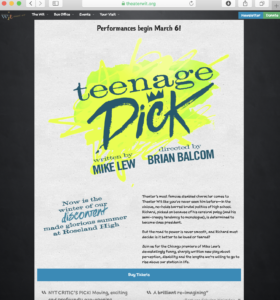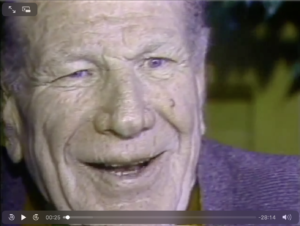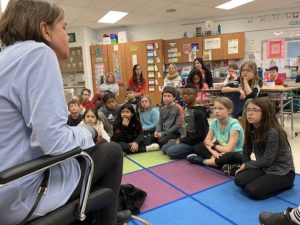Guest Review: Theater Wit’s “Teenage Dick” Looks at Richard III in a New Way
March 11, 2020 • Comments • Posted in guest blog, Seeing Eye dogsUPDATE: The show must go on, coronavirus or not! Brian Balcom, the director, emailed us today to let us know that you can still see the play–virtually. Anyone who wants to see the show can do so within the comfort of their own home. Here’s how:
- Go to the Theater Wit website and purchase a ticket as normal
- 10 minutes before showtime on your selected date, you will be emailed a link to view the performance remotely
I am pleased to introduce my friend Janet Lockwood as a guest blogger today — big thanks go out to Janet and so many others who are sitting in for me with guest posts as my right wrist continues to heal.
An Evening at Theater Wit with Beth and Luna
by Janet Lockwood
And what a delightful evening! I treasure time spent with Beth, whatever the venue. Beth and I went to the same high school, where we got into mild trouble by today’s standards, followed by different colleges, demanding jobs, and various moves.
It is only these past two years that we have reconnected, discovering that we are very much the same people we were in high school, yet, I like to think, much improved.
Last Saturday night, my husband and I accompanied dear Beth to a new play called Teenage Dick, written by Mike Lew and beautifully directed by Brian Balcom at Chicago’s Theater Wit. The play, set in a contemporary high school, is based in part on Richard III, the final play in Shakespeare’s War of the Roses trilogy.
Before the lights went down, I wondered how a high school student setting could capture the epic, neurotic, mercurial, malevolent, Machiavellian Richard III — with laughs, no less.
It turns out that a high school setting works really well with this story, with teenaged characters’ out-sized emotions, overwrought politics, and ruinous competition (to what end?!), with an honorable mention for the adult, a moderately skilled teacher placed in the dual role of the clueless, out of touch, and harried administrator/chaperone. Speaking of dual roles, the high school Beth and I attended required the track and field coach to teach trigonometry. Or maybe it was the other way around. What I remember most is that he yelled during the entire class.
The story is that of a student with cerebral palsy (Dick) who schemes to “dethrone,” at all costs, the current class president, the school dreamboat/football quarterback (Eddie), who has recently broken up with his girlfriend, the young woman everyone wants to date or emulate (Anne). Dick’s best friend is Barbara (Buck), a character who uses a wheelchair.
Let me stop here for two reasons. This is the first time I have seen a play, outside of Richard III, where disability is woven into the plot to be portrayed by actors who have disabilities themselves. Years ago, at the Oregon Shakespeare Festival, I saw a contemporary play memorable only for featuring a leading-role actor who uses a wheelchair. That is the only other time I’ve seen disability portrayed on stage and I am more than a casual patron of theater experiences. It’s way past time to recognize the totality of genius and creativity in the arts, especially in theater, among all who are seeking the opportunity to use their talents for those who want to experience all the theater has to offer.
The second reason I am stopping the ever-so-brief plot synapsis is that I do not want to ruin all the surprises. There are many so I’ll gloss over only a few. Mr. Lew peppers the script with language from Richard III and The Prince. Laugh-out-loud moments give way to initial rumblings and conflict building toward the dramatic conclusion. There are scenes for everyone — fights, dances, love, dismay, and pathology.
During our showing, Beth’s sweet Seeing Eye dog Luna reacted much as we humans reacted — with alarm during the fight scenes and with delight during the dance scenes.
I want to give a shout-out to the actors in order of appearance:
- MacGregor Arney, the actor in the title role, is brilliant, forceful, and relentlessly manipulative as Dick, holding my sometime scattered attention from opening line to the end.
- Tamara Rozofsky, plays stalwart Buck, showing grace, integrity, and humor.
- Liz Cloud holds the characters and script together as Elizabeth, the teacher/administrator, with wit and good humor.
- Ty Fanning as Eddie, the dreamboat quarterback, brings both stereotype and dimension in a believable, natural manner.
- Sarah Price plays Clarissa with razor-sharp comedic timing.
- Courtney Rikki Green, who plays Anne, develops her character powerfully with breadth and without pretense, portraying Anne’s story equal to that of Dick’s story in the end.
I loved this play. I give it four stars and two thumbs up. I don’t speak for Luna, but I think I heard her say four paws. Go see this play!
Teenage Dick By Mike Lew runs through April 19,2020 at Chicago’s Theater Wit 1229 W. Belmont. Directed by Brian Balcom, running Time: 1 hour 30 minutes with no intermission. Tickets available from $12 to $42 and you can order your tickets online here or call the box office at 773.975.8150.



 The nine and ten year-old students displayed such a keen interest in retinopathy (the condition that caused my sight loss) and the methods ophthalmologists used years ago to try to save my eyesight that it worried me. Why were they so interested? Was one of the children in their school facing major eye surgery?
The nine and ten year-old students displayed such a keen interest in retinopathy (the condition that caused my sight loss) and the methods ophthalmologists used years ago to try to save my eyesight that it worried me. Why were they so interested? Was one of the children in their school facing major eye surgery?
